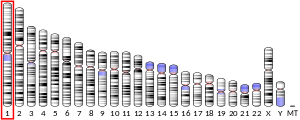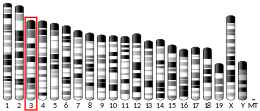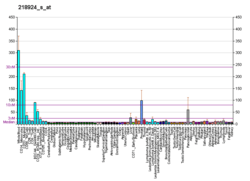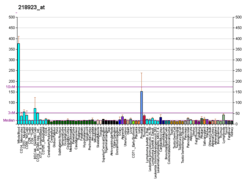CTBS
Di-N-acetylchitobiase is an enzyme that in humans is encoded by the CTBS gene.[5][6][7]
| CTBS | |||||||||||||||||||||||||
|---|---|---|---|---|---|---|---|---|---|---|---|---|---|---|---|---|---|---|---|---|---|---|---|---|---|
| Identifiers | |||||||||||||||||||||||||
| Aliases | CTBS, CTB, chitobiase | ||||||||||||||||||||||||
| External IDs | OMIM: 600873 MGI: 1921495 HomoloGene: 3231 GeneCards: CTBS | ||||||||||||||||||||||||
| |||||||||||||||||||||||||
| |||||||||||||||||||||||||
| |||||||||||||||||||||||||
| |||||||||||||||||||||||||
| Orthologs | |||||||||||||||||||||||||
| Species | Human | Mouse | |||||||||||||||||||||||
| Entrez | |||||||||||||||||||||||||
| Ensembl | |||||||||||||||||||||||||
| UniProt | |||||||||||||||||||||||||
| RefSeq (mRNA) | |||||||||||||||||||||||||
| RefSeq (protein) | |||||||||||||||||||||||||
| Location (UCSC) | Chr 1: 84.55 – 84.57 Mb | Chr 3: 146.45 – 146.47 Mb | |||||||||||||||||||||||
| PubMed search | [3] | [4] | |||||||||||||||||||||||
| Wikidata | |||||||||||||||||||||||||
| |||||||||||||||||||||||||
References
- GRCh38: Ensembl release 89: ENSG00000117151 - Ensembl, May 2017
- GRCm38: Ensembl release 89: ENSMUSG00000028189 - Ensembl, May 2017
- "Human PubMed Reference:". National Center for Biotechnology Information, U.S. National Library of Medicine.
- "Mouse PubMed Reference:". National Center for Biotechnology Information, U.S. National Library of Medicine.
- Fisher KJ, Aronson NN Jr (Apr 1992). "Characterization of the cDNA and genomic sequence of a G protein gamma subunit (gamma 5)". Mol Cell Biol. 12 (4): 1585–91. PMC 369601. PMID 1549114.
- Ahmad W, Li S, Chen H, Tuck-Muller CM, Pittler SJ, Aronson NN Jr (Aug 1995). "Lysosomal chitobiase (CTB) and the G-protein gamma 5 subunit (GNG5) genes co-localize to human chromosome 1p22". Cytogenet Cell Genet. 71 (1): 44–6. doi:10.1159/000134059. PMID 7606925.
- "Entrez Gene: CTBS chitobiase, di-N-acetyl-".
External links
- Human CTBS genome location and CTBS gene details page in the UCSC Genome Browser.
Further reading
- Aronson NN, Halloran BA (2006). "Optimum substrate size and specific anomer requirements for the reducing-end glycoside hydrolase di-N-acetylchitobiase". Biosci. Biotechnol. Biochem. 70 (6): 1537–41. doi:10.1271/bbb.60183. PMID 16794344.
- Kamioka Y, Fukuhara S, Sawa H, et al. (2004). "A novel dynamin-associating molecule, formin-binding protein 17, induces tubular membrane invaginations and participates in endocytosis". J. Biol. Chem. 279 (38): 40091–9. doi:10.1074/jbc.M404899200. PMID 15252009.
- Strausberg RL, Feingold EA, Grouse LH, et al. (2003). "Generation and initial analysis of more than 15,000 full-length human and mouse cDNA sequences". Proc. Natl. Acad. Sci. U.S.A. 99 (26): 16899–903. doi:10.1073/pnas.242603899. PMC 139241. PMID 12477932.
- Hutchinson T, Dwivedi K, Rastogi A, et al. (2002). "N-acetyl beta-D-glucosaminidase is not attached to human sperm membranes through the glycosylphosphatidyl inositol (GPI)-anchor". Asian J. Androl. 4 (1): 27–33. PMID 11907625.
- Liu B, Ahmad W, Aronson NN (1999). "Structure of the human gene for lysosomal di-N-acetylchitobiase". Glycobiology. 9 (6): 589–93. doi:10.1093/glycob/9.6.589. PMID 10336991.
- Aronson NN, Backes M, Kuranda MJ (1989). "Rat liver chitobiase: purification, properties, and role in the lysosomal degradation of Asn-linked glycoproteins". Arch. Biochem. Biophys. 272 (2): 290–300. doi:10.1016/0003-9861(89)90222-1. PMID 2751306.
- Fisher KJ, Aronson NN (1992). "Cloning and expression of the cDNA sequence encoding the lysosomal glycosidase di-N-acetylchitobiase". J. Biol. Chem. 267 (27): 19607–16. PMID 1527079.
This article is issued from Wikipedia. The text is licensed under Creative Commons - Attribution - Sharealike. Additional terms may apply for the media files.





